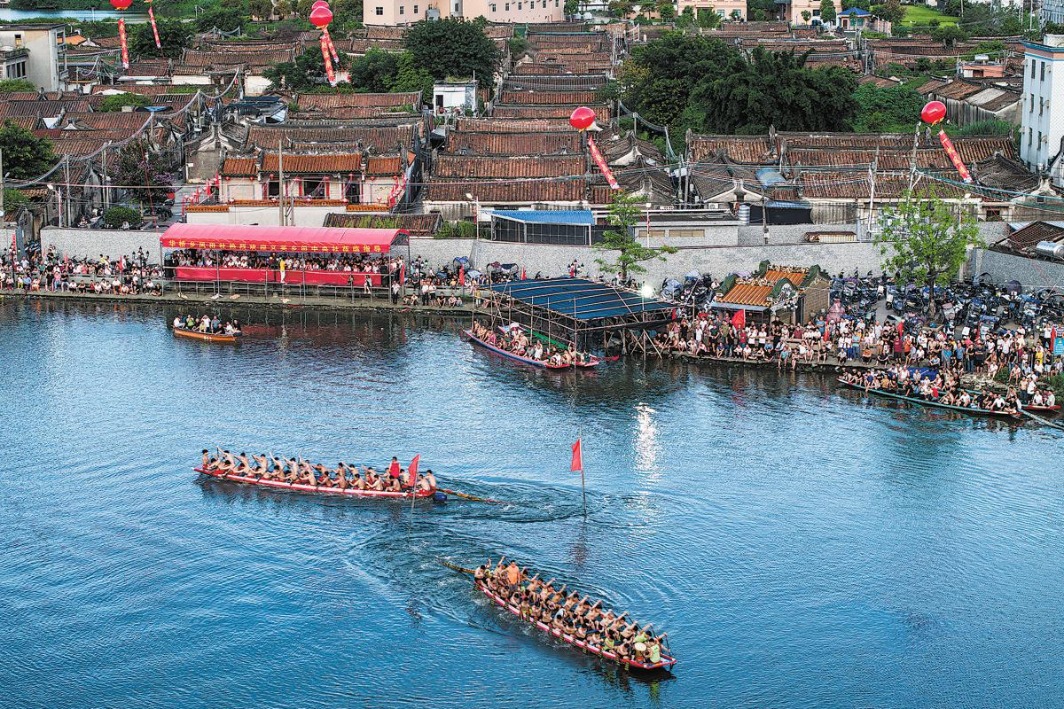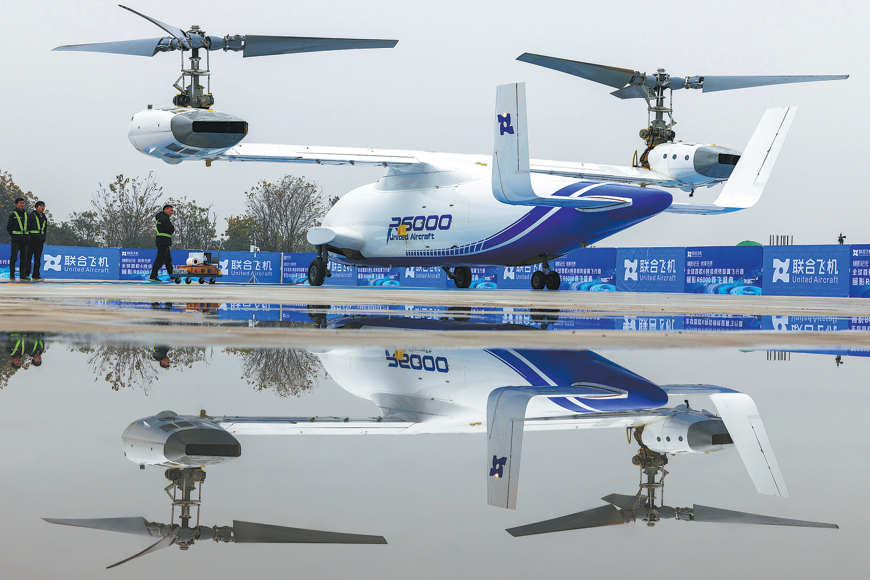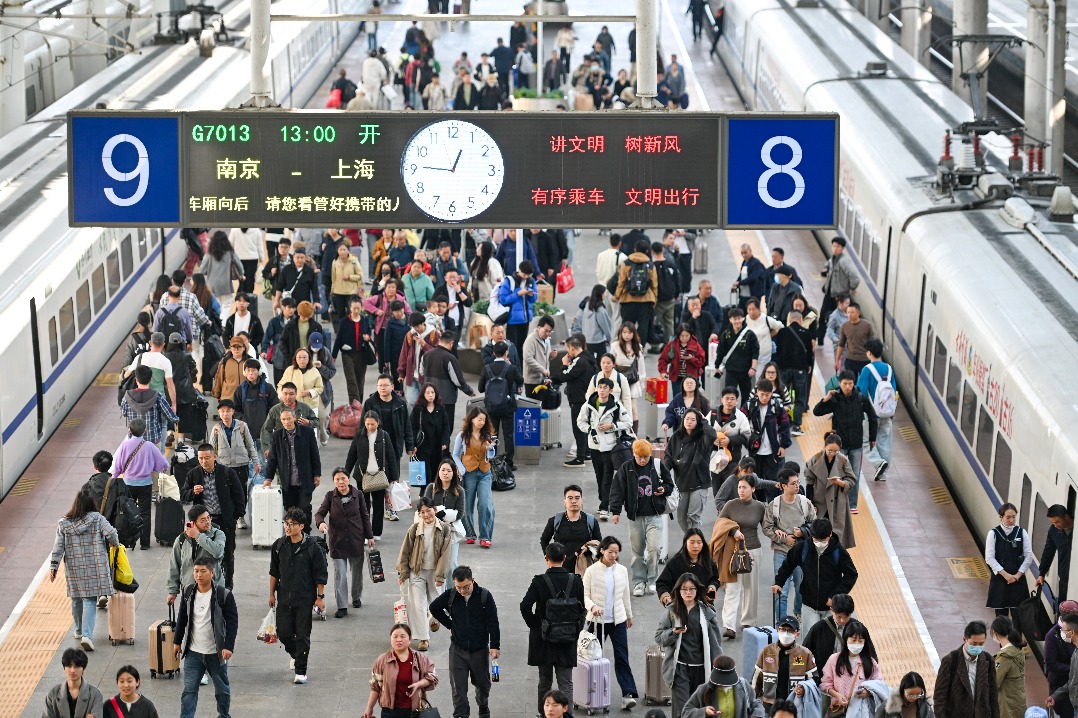What's news

| President Xi Jinping welcomes Kazakh university students in Beijing on June 14. Wu Zhiyi / China Daily |
| Tibetan students learn to make thangka, traditional Tibetan textile paintings, at a vocational school in Yushu, Qinghai province. At a national meeting on June 13, Premier Li Keqiang highlighted the importance of skills-based vocational education. Zhang Hongxiang / Xinhua |
Presidential welcome for Silk Road student
President Xi Jinping welcomed about 200 youngsters from Kazakhstan to Beijing on June 24 as the university students began to retrace the ancient Silk Road, which has given the two countries centuries of close ties.
The students' visit is one of the cultural exchange programs that Xi has promoted since China devised a strategy to revitalize trade and personal ties between China, Central Asia and Europe, through which the ancient Silk Road ran about 2,000 years ago.
The young guests are from Nazarbayev University, where Xi made a speech on China's Central Asia strategy in September and proposed that China and Central Asian countries build an "economic belt along the Silk Road".
It is a trans-Eurasian project spanning from the Pacific Ocean to the Baltic Sea, inhabited by nearly 3 billion people and representing the largest market in the world.
Observers said the plan will revitalize Eurasia's inland civilizations, a development necessary for the stability and development of China's vast western region.
Progress 'depends onchanges in farming'
The next phase of Africa's industrial progress largely depends on modernizing agriculture through policy reforms and technology, a meeting of policymakers in Malabo, Equatorial Guinea, has been told.
At the meeting of the executive council of the African Union, which is made up of ministers of AU member countries, officials stressed that Africa needed to move on from traditional farming to achieve food security.
"Agricultural transformation and food security are key priorities for Africa to propel sustainable development and industrial growth," said Nkosazana Dlamini-Zuma, chairwoman of the commission.
Agriculture and food security were due to be the main topic for discussion during the meeting.
Dlamini-Zuma said adopting new farming technologies would sustain food production in light of rapid population growth and climate change.
"Agro-processing alone will boost industrial growth and create jobs for women and youth. Mechanizing food production systems will uplift the small holders and sustain growth trajectories," she told the gathering.
Foreigners caught for drug crimes increase
Drug offenses involving foreigners rose sharply last year, an official at the Ministry of Public Security says.
Most of the foreign drug trafficking suspects caught are Africans, said Liu Yuejin, director of the ministry's narcotics control bureau.
The ministry said police handled 1,491 drug-related crimes involving foreigners last year, a year-on-year increase of 15.4 percent. A total of 1,963 foreign drug suspects were arrested, an increase of 17.3 percent.
Police also confiscated 5.9 metric tons of drugs, an increase of 31 percent.
"Due to high market demand, the desire for profits, and loose management, foreign drug gangs are active in southern China, including Guangdong and Yunnan provinces and the Guangxi Zhuang autonomous region," Liu said.
Factory output estimate shows stability
A manufacturing gauge for June has hit a seven-month high, indicating that progress has been made in stabilizing the world's second-largest economy thanks to modest policy measures, analysts said.
The preliminary reading of the HSBC/Markit Economics Purchasing Managers Index for the month was 50.8, the highest figure since November, compared with a final reading of 49.4 in May. A figure above 50 indicates expansion.
Economists said the index shows the economy has started to stabilize after Premier Li Keqiang said in London during a recent trip that it would not experience a hard landing.
"This month's improvement is consistent with data suggesting that the authorities' mini-stimulus is filtering through to the real economy," said Qu Hongbin, chief economist for China at HSBC.
The economy grew 7.4 percent in the first quarter, the lowest for 18 months, due to weak domestic and international demand. China has set a target of 7.5 percent for economic growth this year.
Hundreds held in terrorism blitz
Police in the Xinjiang Uygur autonomous region have destroyed an average of one terrorist cell a day in the past month, an official from the regional public security department said on June 23.
Thirty-two groups have been broken up and more than 380 people arrested since May 23, when a one-year anti-terrorism campaign began in Xinjiang.
A total of 264 explosive devices and 3.15 metric tons of materials for making explosives were seized.
The official said the crackdown had led to terrorists reaching the breaking point.
Wang Qianrong, deputy director of the Xinjiang Public Security Department, also said the most recent attack on June 21, on a police bureau in Yecheng, a county in southern Xinjiang's Kashgar prefecture, was a desperate move by the terrorists, who were under "high pressure" from the government.
Thirteen attackers were shot dead as they targeted the public security bureau with explosives. Three policemen were slightly injured but no civilians were hurt, the regional government's information office said.
'Reform needed' for vocational education
Skills-based vocational education is receiving unprecedented attention from the central government as China seeks to ensure high employment and improve the image of perceived "cheap" made-in-China products.
Premier Li Keqiang invited private investors and social enterprises on June 23 to play an important role in helping vocational training attain that goal.
Li made the remarks in his address to participants in the national vocational education meeting. The last such meeting was eight years ago.
"Reform is needed to promote vocational education, in which relations between the government and the market should be properly handled," Li said.
"In addition to the government, social entities, companies and private investors should take part in establishing more vocational training of different levels to integrate practical needs with teaching."
New equipment for railway authority
Vice-President Li Yuanchao has toured the Tanzania-Zambia Railway Authority in Tanzania and handed new equipment supplied under a loan agreement between China, Tanzania and Zambia.
Li handed over the equipment, including six forklifts and four mobile cranes, to Tanzanian Minister of Transport Harrison Mwakyembe on behalf of the railway authority.
Li, who took a short ride on a train to Yombo on the outskirts of the commercial capital, Dar es Salaam, commended the authority and its workers for maintaining the infrastructure, built 40 years ago.
Li, on a six-day visit to Tanzania, promised to hold further discussions with his colleagues when he goes back to China to find more ways to help the railway authority.
Mwakyembe said the assistance was part of the pledge made by the Chinese government to help improve railway infrastructure and his country would continue to value the assistance rendered by China since the early 1970s.
Gratitude extended for help to China
China is committed to deepening its ties with Zambia, the Chinese Vice-President Li Yuanchao said in Lusaka.
China and Zambia have engaged in frequent exchanges in politics, trade and culture in recent years, which not only boost their traditional friendship, but also promote the sound and steady development of bilateral ties, Li said on June 19 as he met Zambia's first president, Kenneth Kaunda.
The ties have set an example for China-Africa ties as well as collaboration between developing countries, Li said.
He also expressed his gratitude for the help Zambia and Tanzania had given in ensuring China was given a permanent seat at the United Nations Security Council.
Kaunda, 90, said he was happy that this year marks not only the 50th anniversary of Zambia's independence, but also the 50th anniversary of the establishment of diplomatic relations between China and Zambia.
New map incorporates South China Sea

The official map of China, which previously included an inset to reflect its South China Sea territories, has been extended vertically to include the country's maritime areas in the main cartography.
The South China Sea territories are based on the country's nine-dash line, which covers the Xisha, Zhongsha and Nansha island groups and surrounding waters of more than 2 million square kilometers.
"The new map gives readers a direct impression about the country's territories," Lei Yixun, chief editor of Hunan Maps Press, the publisher, told Xinhua News Agency on June 24.
There is no special distinction in China's territorial land and water areas that justify an inset, so the new map was simply extended vertically to include the maritime areas, he said.
Xinhua reported that the National Administration of Surveying, Mapping and Geoinformation authorized the new map.
New medical center responds to demand
An innovative medical center in one of the capital's new towns will attract domestic and international investors amid growing demand for quality medical services, a development figure said.
The Beijing International Medical Center, in Tongzhou district, will cover 15 square kilometers and host non-government-funded medical institutes like those from the private sector.
World-leading medical and nursing services will be available and research and teaching facilities, said Han Xiaofang, a member of the Beijing Municipal Commission of Development and Reform.
Crackdown on Web terrorism material
Anti-terrorism experts said the crackdown on terrorist-linked video and audio content on the Internet must intensify, as such information has fueled the spread of religious extremism and terrorist attacks in China.
Video and audio files put out on the Internet by the East Turkistan Islamic Movement have risen sharply, from 32 files in 2012 to 109 last year. In the first three months of this year, the terrorist group put out 36 such files.
Terrorist attacks in China also rose sharply last year, and the video and audio files are a direct cause of the increase, security analysts said.
The State Internet Information Office has asked Web companies to eliminate terrorism-related content. More than 30 enterprises, including Internet giant Sina and video platform Youku, also signed an agreement on improving oversight of online information.
Lawyers tapped in transnational cases
More Chinese lawyers will be promoted as legal advisers in state-owned companies for transnational business, amid concerns over national and economic security, a senior officer of the All-China Lawyers Association says.
Most state-owned companies have been hiring foreign lawyers and accountants for cross-border lawsuits or transnational transactions, which can potentially compromise national economic security, said Wang Junfeng, director of the association.
"We will encourage more senior lawyers at the national level to serve as counsels and represent some transnational litigation, especially for the 50 major state-owned enterprises, including China National Petroleum Corporation and State Grid Corporation of China."
Landmark Taiwan trip bolsters Straits links
The mainland's chief Taiwan affairs official began a four-day trip to the island on June 25 by greeting people in the Minnan dialect, a major local language.
Zhang Zhijun, the first such official to visit the island since 1949, also said: "It took me only three hours to fly from Beijing to Taipei. However, it has taken 65 years for cross-Straits ties to take this step."
People from both sides have benefited from peaceful development in recent years, he said.
Zhang said cross-Straits ties should be boosted continuously despite the many challenges.
He made the remarks during a meeting with Wang Yu-chi, director of Taiwan's "Mainland Affairs Council". It is the second meeting between the two this year, following one held on the mainland in February.
Efforts to preserve old canal stepped up
When the Grand Canal, the world's longest artificial waterway, was inscribed on the World Heritage list at UNESCO's 38th session of the World Heritage Committee on June 22 in Doha, Qatar, excitement stirred among the Chinese delegation.
The earliest work on the canal can be traced to the 6th century BC, and the canal was first connected as a whole in the 7th century AD. The length of the canal and its tributaries is about 3,000 kilometers. Of that total, 1,011 km of the canal, a part that passes through 35 cities and includes 58 historical sites, has been designated for the World Heritage list.
Jiang Shili, deputy head of the application office for World Heritage, said the southern part of this important communication channel connecting northern and southern China in ancient times still functions well today and is considered a special heritage because it is "alive".
China Daily-Xinhua
| A Chinese expert gives a briefing on the Tanzania-Zambia Railway to Vice-President Li Yuanchao (right) in Dar es Salaam, Tanzania on June 25. Zhang Ping / Xin Hua |
(China Daily Africa Weekly 06/27/2014 page2)
Today's Top News
- Maduro pleads not guilty in US court
- US military action against Venezuela lacks of respect for intl law: UN chief
- Starmer hints at thaw in EU relations
- Germany records fewer asylum applications
- Steady Sino-Irish ties serve common interests: China Daily editorial
- Keeping China-ROK relations on healthy track benefits both countries and region

































